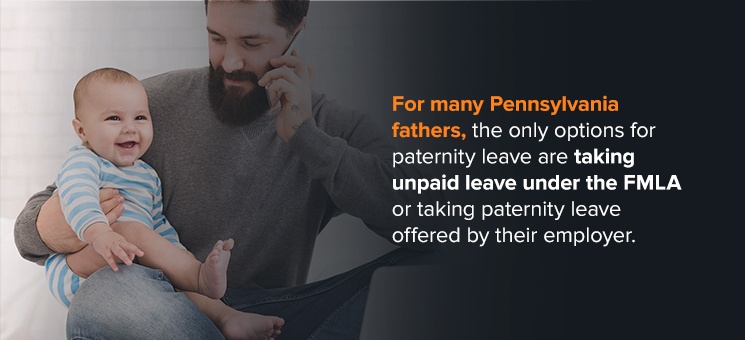By Weisberg Cummings, P.C. on December 29th, 2020
What options do working dads have in PA? Is paternity leave required? Unfortunately, America does not provide much in the way of paternity leave for new fathers. Though many other countries around the world offer paternity leave, the U.S. does not. Just a few states have passed paternity leave and family leave laws. This lack of optional paid time off for parents can hurt families, children and society.
At the federal and state level, many working parents have not received the support they need, especially working fathers. Despite this lack of paternity leave, there are several laws in the U.S. for paid family and parental leave.
Paternity Leave Laws
At the federal level, the only protections currently in place for American fathers come from the Family and Medical Leave Act (FMLA). While the FMLA applies to most parents, it does not apply to all of them. The FMLA also only mandates unpaid leave, not paid leave. This means new fathers may not be able to afford to stay home with their children, even if they are legally entitled to take FMLA leave.
PA Paternity Laws
In Pennsylvania, paternity leave is not required to be offered to new fathers. For many Pennsylvania fathers, the only options for paternity leave are taking unpaid leave under the FMLA or taking paternity leave offered by their employer.
Companies are increasingly offering paid parental leave, but employers who extend this option are still the minority. Many of the companies that do offer paternity leave only offer it for workers they are concerned about retaining. These workers are typically higher-ranking employees with skills that are in demand.
Paternity Leave Laws in Other States
Currently, there are just a few states that have paternity leave requirements, including:
- California: In California, the first of the paid parental leave laws in America was passed in 2002. After the law was put in place, a new parent could receive 55% of their wages for a maximum of six weeks. This percentage was increased in 2018 to 60% or 70% of the parent’s income.
- New Jersey: In New Jersey, a paid family leave law was passed in 2008. A new parent can receive a maximum of two-thirds of their wages for as many as six weeks.
- New York: The New York paid leave program is considered the most generous program in the U.S. A parent can take up to 10 weeks off from work after the birth of their child and be paid at a rate of 50% of their wages. Each year, this weekly payment increases.
- Rhode Island: In Rhode Island, a paid family leave law was passed in 2013. Currently, the law in Rhode Island provides up to four weeks of wage replacement at a maximum of 60% of the parent’s typical wages.
- Washington, D.C.: In Washington, D.C., a bill was passed allowing parents to take up to eight weeks off. Depending on their income, parents can receive up to 90% of their usual wages.
New Hampshire also mandates paternity leave. Paid parental leave bills have passed in cities in some states like North Carolina, Florida and Ohio for municipal employees. Some states are also currently considering paid leave laws, including:
- Oregon
- Vermont
- Colorado
- Connecticut
- Massachusetts
New fathers living in other states will receive paid leave only if it is offered by their employers.
FMLA Leave for Fathers
For many fathers, it can be difficult to take time off to devote to caring for their growing families. Since there are currently no specific federal laws that mandate employers to offer maternity or paternity leave, the Family and Medical Leave Act is many employees’ only option for any kind of parental leave.
How Does Paternity Leave Work Under FMLA?
What is offered through the FMLA for paternity leave? A new parent may be able to take as many as 12 weeks of unpaid leave under the FMLA without the risk of job loss. Eligible employees can take this unpaid parental leave following the birth, adoption or fostering of a child.
Some fathers choose to take their FMLA leave right away, and others opt to wait until after the mother has used all of her leave. However, if both the father and mother work for the same employer, the employer only needs to provide 12 weeks of unpaid leave for both parents rather than 12 weeks for each parent.
During FMLA leave, employees should continue to be provided with benefits like health insurance and should be protected from employer retaliation. When a father returns to his job, he should be restored to his same position or an equivalent position in terms of benefits, pay and terms and conditions.
Who Qualifies for FMLA Leave?
Companies that meet the following requirements are typically covered by the FMLA:
- Private-sector employers that have at least 50 employees who have worked at least 20 workweeks in the current or previous calendar year.
- Private or public elementary or secondary schools, regardless of how many employees the schools employ.
- Public agencies, including federal, state or local government agencies, regardless of how many employees the agencies employ.
Even if an employee works for a covered employer, not every employee is eligible for the FMLA. To be eligible to take parental leave under this Act, you must meet the following requirements:
- Have worked for this employer for a minimum of 12 months
- Have worked a minimum of 1,250 hours over the last 12 months
- Work for a company that employs a minimum of 50 employees within 75 miles
Due to these requirements, most small business employees and part-time workers are unable to take leave under the FMLA. This leaves a large portion of American workers without an option for paternity leave.
Request a Free Consultation From Weisberg Cummings, P.C.
Our employment lawyers at Weisberg Cummings can assist individuals throughout the state of Pennsylvania. We can provide personal, thoughtful service and will take time to learn as much as we can about your goals and situation. We will utilize our decades of experience to stand up for your rights in employment law matters.
Our employment lawyers can skillfully handle a range of law matters on this subject, such as:
Contact us to learn more about paternity leave in PA or to request a free consultation with a lawyer at Weisberg Cummings, P.C today.



